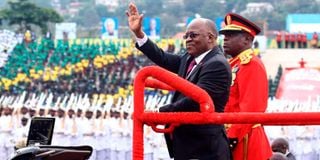Premium
Despite his flaws, Magufuli blazed the trail for other leaders in Africa

Tanzanian President John Magufuli waves as he attends a ceremony marking the country's 58th independence anniversary at CCM Kirumba stadium in Mwanza on December 9, 2019.
Tanzania’s cashew nuts, among the best in the world, are the lifeblood of the country’s hard currency exports. But as is depressingly common in Africa, the farmers were struggling as middlemen skimmed off their income.
Acting to rectify this iniquitous anomaly when he became President in 2015, Dr John Pombe Magufuli directed these cartels to significantly increase payments to the farmers. When they refused, he handed cashew nut purchasing to the Agriculture Development Bank and simultaneously gave the military the responsibility to peel and bag the crop.
In two years, the farmers were earning nearly double their previous return, and planting much more, accelerating production.
In every economic sector, he took decisive, unorthodox and even disruptive steps to shake up the system in his singular determination to uplift the lives of the common man. In just five years, he achieved more than just about any African leader in the past 40 years.
Highly autocratic
He was immensely popular at home, winning last October’s election by a huge margin, admittedly against a newcomer who had only entered politics five years earlier. Even if the allegations of electoral impropriety were justified, they would not have made a material dent in the 84 per cent of the vote Magufuli garnered, exceeding Jakaya Kikwete’s record 80 per cent that made him President in 2010.
Magufuli was highly autocratic and rode roughshod over many core democratic principles to which most African leaders proclaim fealty. In trying to lift up the struggling against entrenched, unyielding powers that control African politics and economy, he imposed heavy restrictions on civil society, political campaigns and media freedoms.
A conservative Christian, some of his actions also seemed misogynous — such as expelling schoolgirls who became pregnant in a bid to deter self-destructive behaviour. But he did choose as his running mate Samia Suluhu Hassan, who would become the only woman president among 54 African leaders, East Africa’s first and only the third in the continent’s modern history.
Stance on Covid-19
But what rightly drew the most widespread condemnation was his stance on Covid-19 and mocking of the science needed to address it, which resulted in many deaths. But he was not alone in this huge failing: The highly respected President Thabo Mbeki adopted a similar anti-scientific approach on the infinitely more virulent HIV-Aids pandemic in South Africa. On the coronavirus, a number of other leaders, not just African, adopted similarly irresponsible stances.
I do not believe though that Magufuli’s approach on Covid-19 had a hidden self-serving agenda: Not many presidents anywhere have as unblemished a record of personal integrity as he did. Both The New York Times and CNN praised him for his stand on corruption before beginning to lambast him on his violations of democratic and human rights principles and practices. Principles, I dare say, that America itself is all too familiar with.
I am a strong believer in those democratic principles. However, that does not mean societies are forbidden to challenge them — especially when such democratic norms have failed to reduce bitter impoverishment, gross inequality and deep-rooted corruption in the economy. It really is past time we began challenging the overall, globally enforced dogma that has failed to deliver for most people.
The other key to Magufuli’s success was his recognition of the private sector as pivotal to growth and human well-being, which helped the surge in concrete, more equitable services at a pace never before seen in Tanzania.
It is now among the 10 fastest-growing economies at 6.8 per cent, twice the African average, earning it a World Bank upgrade from low- to lower-middle-income status in 2019.
As businessman Anic Kashasha emphasised to me, “Magufuli’s example and success should persuade other African leaders to shun the plundering of their economies and rule their countries in the best interest of ‘the common man.” Despite his known flaws, he was a remarkable person and leader; we should emulate large parts of his legacy.





